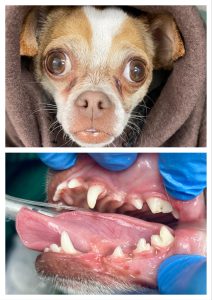Pet Dental Care for Dogs and Cats in Branson, MO
Maintaining Oral Health Is an Important Way to Promote a Long, Comfortable Life

Why Is Dental Care Important for Pets?
Good pet dental care is essential to your dog or cat’s overall health and comfort. Just like people, pets can develop gum disease, tooth decay, and painful infections. Here’s why dog and cat dental care should never be overlooked:
- Pets with gingivitis are uncomfortable, and advanced periodontal disease is painful.
- Gum disease can lead to infections of the heart, kidneys, and other organs.
- Preventing advanced dental disease is cheaper, safer, and less painful than treating severe conditions.
- Foul breath (or bad breath in dogs and cats) makes it harder to enjoy the company of your pet.
We also offer a payment plan for dental procedures, making it easier to provide your pet with the care they need. Ask our team for details when scheduling your pet’s next visit!
Understanding Dental Grading in Pets

Grade 0
No plaque or gingivitis present. Young, healthy dogs and cats between 6 and 12 months of age are often grade 0. It’s advised to combine brushing with VOHC-approved dental chews or other supplements.
Grade 1
Mild plaque present. This stage is often reversible with teeth brushing and appropriate chewing. The daily use of VOHC-approved dental chews and oral care products helps keep teeth clean. Otherwise, a professional dental cleaning is recommended.
Grade 2
Mild to moderate tartar and gingivitis are present on multiple teeth. X-rays may show up to 25% bone loss. A professional cleaning is necessary to prevent further decay and discomfort.
Grade 3
Heavy tartar buildup and periodontal disease are evident. This stage is painful, and tooth lesions or fractures may be hidden under tartar. Advanced treatment and consistent pet dental care at home—such as brushing and dental chews—can help control disease progression.
Grade 4
Severe tartar, periodontal disease, and pain are present. More than half of the tooth’s bone support is gone, and tooth loss is imminent. Professional veterinary dental services for pets, including extractions, are urgently needed.
Anesthetized Dental Evaluation & Cleaning
According to national guidelines, an anesthetized veterinary dental cleaning with x-rays is indicated when tartar or gingivitis is seen, or at least once a year starting at age one for cats and small to medium dogs, and at age two for large dogs.
At Animal Care Clinic, we follow the highest standards of safety and comfort:
 Advanced anesthetics and continuous monitoring by a licensed veterinary nurse anesthetist
Advanced anesthetics and continuous monitoring by a licensed veterinary nurse anesthetist- Pre-anesthetic exam and lab work to identify any risks
- IV catheter placement for fluids and emergency access
- Gas anesthesia and oxygen delivery through an endotracheal tube to protect airways
- Comprehensive pain management before, during, and after the procedure
During your pet’s cleaning, we perform full-mouth dental x-rays, probing, and charting. These steps help us find hidden problems like fractures, abscesses, or root issues that visual exams might miss. Because a thorough oral exam isn’t possible without anesthesia, we tailor each dog or cat dental treatment based on what we find during the procedure.
If additional treatment is needed, we’ll update you with a revised care plan and discuss options, which may include follow-up visits for complete care.
Common Treatments for Moderate to Advanced Dental Disease
- Oral surgery and extractions with local nerve blocks, post-op x-rays, and laser therapy
- Enamel sealant application
- Periodontal therapy
- Post-procedure pain control
Home Dental Care Tips
Daily home care goes a long way toward maintaining your pet’s oral health. Here are a few teeth brushing tips:
- Start slowly and use flavored pet toothpaste.
- Brush in small circles along the gum line.
- Reward your pet afterward to build a positive association.
- Combine brushing with VOHC-approved dental chews or other supplements for extra plaque control.
If you’re wondering how to brush a pet’s teeth or what products to use, our team is happy to guide you during your pet’s next visit.
What Does a Dental Cleaning for Your Pet Cost?
The cost of pet dental cleaning can vary based on your pet’s age, size, and oral health. Since every pet’s needs differ, we’ll provide an individualized estimate after examining your pet’s mouth. Investing in preventive dental care is almost always less expensive—and far safer—than treating advanced dental disease later.
Payment plans are available for dental procedures, making it easier to provide your pet with the care they need.
Read more from Dr. Alison on dental health for dogs and cats to learn how proactive oral care supports a longer, happier life.
